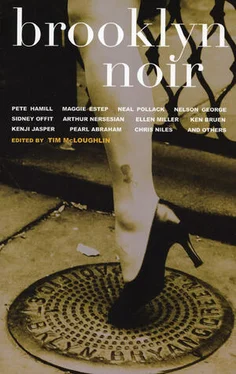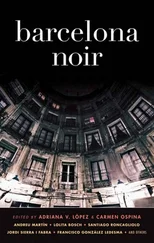From the inside looking out: Picture an embassy in a foreign country. A truly foreign country. Not a Western European ally, but a fundamentalist state perennially on the precipice of war. A fill-the-sandbags-and-wait-for-the-airstrike enclave. That was Olsen’s, home to the last of the donkeys, the white dinosaurs of Sunset Park. A jukebox filled with Kristy McColl and the Clancy Brothers, and flyers tacked to the flaking walls advertising step-dancing classes, Gaelic lessons, and the memorial run to raise money for a scholarship in the name of a recently slain cop. Within three blocks of the front door you could attend a cockfight, buy crack, or pick up a streetwalker, but in Olsen’s, it was always 1965.
Upon entering the bar for the first time in several years, I found its pinched dimensions and dim lighting more oppressive, and less mysterious, than I had remembered. The row of ascetic faces, and the way all conversation trailed off at my entrance, put me in mind of the legendary blue wall of silence in the police department. It is no coincidence that the force has historically been predominantly Irish. The men in Olsen’s would be pained to reveal their zip code to a stranger, and I wasn’t sure if even they knew why.
The bar surface itself was more warped than I’d recalled. The mirrors had oxidized and the white tile floor had been torn up in spots and replaced with odd-shaped pieces of green linoleum. It was a neighborhood bar in a neighborhood where such establishments are not yet celebrated. If it had been located in my part of the East Village, it would have long since achieved cultural-landmark status. I’d been living in Manhattan for five years and still had not adjusted to the large number of people who moved here from other parts of the country, and overlooked the spectacle of the city only to revere the mundane. One of my coworkers, herself a transplant, remarked that the coffee shop on my corner was authentic . In that they served coffee, I suppose she was correct.
I sat on an empty stool in the middle of the wavy bar and ordered a beer. I felt strangely nervous there without my father, like a child about to be caught doing something bad. Everyone knew me. Marty, the round-shouldered bartender, approached first, breaking the ice. He spoke around an enormous, soggy stub of a cigar, as he always did. And, as always, he seemed constantly annoyed by its presence in his mouth; as though he’d never smoked one before, and was surprised to discover himself chewing on it.
“Daniel. It’s good to see you. I’m sorry for your loss.”
He extended one hand, and when I did the same, he grasped mine in both of his and held it for a moment. It had to have been some sort of signal, because the rest of the relics in the place lurched toward me then, like some nursing-home theater guild performing Night of the Living Dead. They shook hands, engaged in awkward stiff hugs, and offered unintelligible condolences. Frank Sanchez, one of my father’s closest friends, squeezed the back of my neck absently until I winced. I thanked them as best I could, and accepted the offers of free drinks.
Someone — I don’t know who — thought it would be a good idea for me to have Jameson’s Irish whiskey, that having been my father’s drink. I’d never considered myself much of a drinker. I liked a couple of beers on a Friday night, and perhaps twice a year I would get drunk. I almost never drank hard liquor, but this crew was insistent, they were matching me shot for shot, and they were paying. It was the sort of thing my father would have been adamant about.
I began to reach for the photograph in my pocket several times and stopped. Finally I fished it out and showed it to the bartender. “Who is she, Marty?” I asked. “Any idea?”
The manner in which he pretended to scrutinize it told me that he recognized the woman immediately. He looked at the picture with a studied perplexity, as though he would have had trouble identifying my father.
“Wherever did you get such a thing?” he asked.
“I found it in the basement, by my father’s shop.”
“Ah. Just come across it by accident then.”
The contempt in his voice seared through my whiskey glow, and left me as sober as when I’d entered. He knew, and if he knew they all knew. And a decision had been reached to tell me nothing.
“Not by accident,” I lied. “My father told me where it was and asked me to get it.”
Our eyes met for a moment. “And did he say anything about it?” Marty asked. “Were there no instructions or suggestions?”
“He asked me to take care of it,” I said evenly. “To make everything all right.”
He nodded. “Makes good sense,” he said. “That would be best served by letting the dead sleep, don’t you think? Forget it, son, let it lie.” He poured me another drink, sloppily, like the others, and resumed moving his towel over the bar, as though he could obliterate the mildewed stench of a thousand spilled drinks with a few swipes of the rag.
I drank the shot down quickly and my buzz returned in a rush. I hadn’t been keeping track, but I realized that I’d had much more than what I was used to, and I was starting to feel dizzy. The rest of the men in the room looked the same as when I walked in, the same as when I was twelve. In the smoke-stained bar mirror I saw Frank Sanchez staring at me from a few stools away. He caught me looking and gestured for me to come down.
“Sit, Danny,” he said when I got there. He was drinking boilermakers. Without asking, he ordered each of us another round. “What were you talking to Marty about?”
I handed Frank the picture. “I was asking who the woman is.”
He looked at it and placed it on the bar. “Yeah? What’d he say?”
“He said to let it lie.”
Frank snorted. “Typical donkey,” he said. “Won’t answer a straight question, but has all kinds of advice on what you should do.”
From a distance in the dark bar I would have said that Frank Sanchez hadn’t changed much over the years, but I was close to him now, and I’d seen him only last night in the unforgiving fluorescent lighting of the funeral home. He’d been thin and handsome when I was a kid, with blue-black hair combed straight back, and the features and complexion of a Hollywood Indian in a John Wayne picture. He’d thickened in the middle over the years, though he still wasn’t fat. His reddish brown cheeks were illuminated by the roadmap of broken capillaries that seemed an entrance requirement for “regular” status at Olsen’s. His hair was still shockingly dark, but now with a fake Jerry Lewis sheen and plenty of scalp showing through in the back. He was a retired homicide detective. His had been one of the first Hispanic families in this neighborhood. I knew he’d moved to Fort Lee, New Jersey long ago, though my father said that he was still in Olsen’s every day.
Frank picked up the picture and looked at it again, then looked over it at the two sloppy rows of bottles along the back bar. The gaps for the speed rack looked like missing teeth.
“We’re the same,” he said. “Me and you.”
“The same, how?”
“We’re on the outside, and we’re always looking to be let in.”
“I never gave a damn about being on the inside here, Frank.”
He handed me the photo. “You do now.”
He stood then, and walked stiffly back to the men’s room. A couple of minutes later Marty appeared at my elbow, topped off my shot, and replaced Frank’s.
“It’s a funny thing about Francis,” Marty said. “He’s a spic who’s always hated the spics. So he moves from a spic neighborhood to an all-white one, then has to watch as it turns spic. So now he’s got to get in his car every day and drive back to his old all-spic neighborhood, just so he can drink with white men. It’s made the man bitter. And,” he nodded toward the glasses, “he’s in his cups tonight. Don’t take the man too seriously.”
Читать дальше












